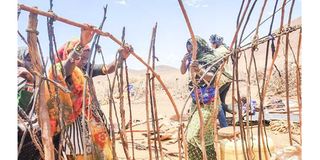Marsabit women want peace, security prioritised

Marsabit women repair a hut at Shankera manyatta in North Horr on September 2, 2022. Women peace ambassadors want women at the grassroots involved in peacebuilding and conflict prevention and resolution.
What you need to know:
- Last week, some women peace ambassadors petitioned Governor Mohamud Ali to adopt women’s peace and security agenda and integrate it into the County Integrated Development Plan.
- They said that they have decided to drop victimhood and actively endeavour to end violence, brutality, and discrimination against them.
Most women in northern Kenya are caught in a double bind of patriarchy and conflicts. They, alongside girls, bear the brunt of interethnic conflicts.
When Resolution 1325 was passed in 2000, there was a genuine glimmer of hope that the roles of women in multiple conflict-mitigating processes would be placed on the front burner.
However, this is not the case in this region, and Marsabit in particular. Female residents continue to play peripheral roles in peacebuilding and conflict-prevention because of the patriarchal nature of this society.
Last weekend, a section of women peace ambassadors felt enough was enough and petitioned Marsabit Governor Mohamud Ali to adopt women’s peace and security (WPS) agenda and integrate it into the County Integrated Development Plan (CIDP).
Speaking to journalists on behalf of the caucus, Amina Aila explained that Marsabit women had decided to drop victimhood and actively endeavour to end violence, brutality, and discrimination against them.
“It is absurd that women and girls have always borne the brunt of a series of violent conflicts witnessed in our county but are always pushed to the periphery during peacebuilding processes,” Ms Aila said.
She said that by adopting the agenda, they would be empowered to encourage grassroots feminist activism in the management and resolution of conflicts. They said women in conflict-prone zones can employ this crucial instrument to become active agents of change, not victims.
Wake-up call
Ms Aila termed the petition a wake-up call for the county, asserting that realising sustainable peace requires the backing of both national and county governments. She said scarcity of resources, poverty, illiteracy, and deeply entrenched patriarchal systems are the key deterrence against socioeconomic development of pastoralist women.
Also read: Marsabit turns to learners to promote peace
Brenda Almasi lamented that the state still maintains an ambivalent approach to the implementation of the WPS agenda since it was passed over 20 years ago. Despite Kenya adopting the National Action Plan, it has neither enforced the resolution nor found it rewarding.
She observed that through compliance, Marsabit would garner legitimacy of being a strong advocate of WPS and ensure gender mainstreaming in conflict resolution and prevention.
Saku Accountability Forum CEO James Forole, who midwifed the drafting of the Marsabit County Action Plan and the petition, decried the continued marginalisation of women, saying they are excluded from institutional politics and denied a voice even on basic human rights. The project was funded by UN Women and the Finnish embassy.
Political value
The adoption of such a plan can create spaces for negotiations in other areas of the public sphere and enable women’s activism to gain great political value and legitimacy for their struggles, he said.
County Civic Education and Public Participation director Orge Baji expressed optimism that the WPS would bolster women’s bid for a permanent role as torchbearers in peacemaking, and elevate and reinforce its pillars of protection, prevention and participation.
Marsabit Tourism, Culture, and Gender Services director Jane Jillo promised to ensure the petition reached Governor Ali and be incorporated into the CIDP. She held that a tool like Resolution 1325 would be effective if it also upheld the demands of women working for peace at the grassroots.
Ms Jillo urged the peace ambassadors to reach all corners of the county and enlighten women on the resolution, adding that failure to recognise their history of peacemaking had made them feel divorced from such a crucial process.
She was optimistic that it would have an impact on thousands of lives and put women on the path towards decent living, human development, and peacemaking. “Many women have tried to intervene in the interethnic conflicts witnessed in this county, not just as mothers but as women of a community. And with this powerful tool, we feel that their struggles will now bear fruit.”




